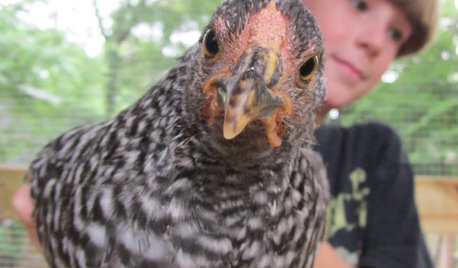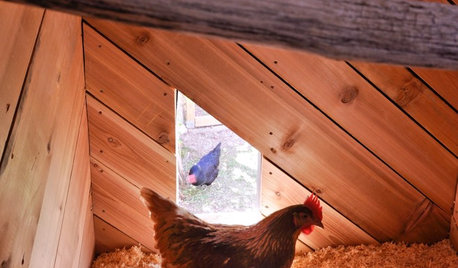chicken droppings/blood on eggs question
claraserena
16 years ago
Related Stories

FARM YOUR YARD4 Farm-Fresh Chicken Coops in Urban Backyards
These Atlanta henhouses are worth crowing about for their charming, practical designs
Full Story
HOUSEKEEPINGOut, Darn Spot! Tips for Removing Carpet Stains
Know the right solutions and when to use them to prevent stains from pets, soda, chocolate, blood and more
Full Story
EDIBLE GARDENSA Formerly Weedy Lot Now Brims With Edibles and Honeybees
Photographers transform their barren backyard into an oasis filled with fruit, vegetables, honey, eggs and more
Full Story
BEDROOMSHouzz Quiz: What Color Should You Paint Your Bedroom Walls?
Cool and soothing, or warm and spicy? Answer these questions and learn what hue is right for you
Full Story
PETSHens Nest in Style in a Modern Nevada Coop
Take a mini tour of a backyard chicken coop built by a pro designer with all the essentials for the 'clients' and then some
Full Story
KITCHEN DESIGNA Cook’s 6 Tips for Buying Kitchen Appliances
An avid home chef answers tricky questions about choosing the right oven, stovetop, vent hood and more
Full Story
LIFEHow to Get Along With the Neighbors — and Live Happier at Home
Everyone wins when neighbors treat one another with kindness, consideration and respect
Full Story
OUTDOOR KITCHENSYour Guide to Grills and More for Great Outdoor Cooking
Learn the pros and cons of gas versus charcoal grills, and about neat add-ons that let you do more
Full Story
DECORATING GUIDESMake Your Preloved Piece the Star of the Show
Help your secondhand treasures command attention with these decorating hints and display tips
Full Story
EDIBLE GARDENSSummer Crops: How to Grow Tomatoes
Plant tomato seedlings in spring for one of the best tastes of summer, fresh from your backyard
Full Story





velvet_sparrow
sheryl_ontario
Related Professionals
Glendora Landscape Architects & Landscape Designers · Mitchellville Landscape Architects & Landscape Designers · Fairhope Landscape Contractors · Florham Park Landscape Contractors · Hurricane Landscape Contractors · Mission Viejo Landscape Contractors · New Cassel Landscape Contractors · Pleasant Grove Landscape Contractors · Charleston Fence Contractors · Columbia Fence Contractors · Tulsa Fence Contractors · Arlington Heights Decks, Patios & Outdoor Enclosures · Kyle Decks, Patios & Outdoor Enclosures · Palmetto Decks, Patios & Outdoor Enclosures · Salisbury Decks, Patios & Outdoor Enclosuresluke_oh
Alundd_hotmail_com
velvet_sparrow